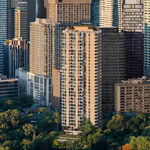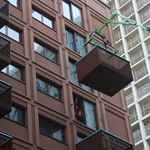The thing that needs to be considered in this is the issue of captive riders vs choice riders. In otherwords, people who ride the TTC because they have no other option (usually people with limited income who can't afford a car, be they on welfare, children, or the elderly), and people who choose to ride the TTC for practical/environmental/social reasons. The optimal fare structure would maximize the number of choice riders, while not disadvantaging captive riders.
After reading through the thread, I've noticed a couple of you are making a fairly flawed assumption: that a decrease in fare cost for people in the inner city would result in a decrease in revenue unless the fares for outer city residents was increased to compensate. This is not necessarily true. The number of people who live relatively close to downtown who walk/bike/cab to work may choose to take the TTC every now and then, and the number of discretionary trips using the TTC in downtown would increase significantly. $3 is a pretty steep price to pay for going 4 subway stops, but if it was only $1.50, more people would seriously consider it a valid option. In this case, the increase in the number of users would help balance out the decrease in revenue per user.
Another thing that could be implemented in order to increase the number of discretionary riders is to implement time-based transfers. Living in Ottawa most of my life, I've had extensive experience with this type of system. I can say that it certainly makes a lot more sense, especially for disrectionary trips. A 5 minute bus ride to the grocery store, 15 minutes inside the store, and a 5 minute bus ride back should not cost you $6 in fares. That's rediculous. The number of trips that are currently being missed because the TTC is dismissed as being too expensive, and people would rather cab or walk, would more than offset the loss of fare revenue as a result of this new system. For most people, the time between the trip to and the trip from would be outside of the transfer time anyway, but it would be a huge convenience for those who do want to use the system in this way.




